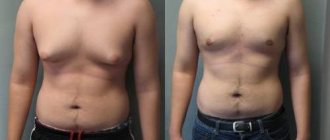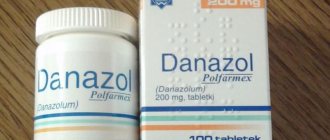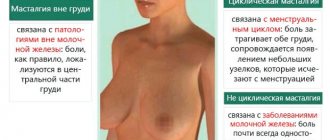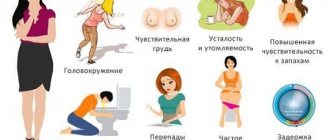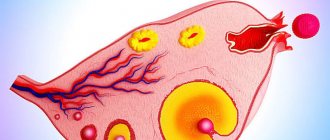If your breasts become enlarged before your period, this is due to fluid retention and swelling. From puberty to menopause, women go through the same changes every month, corresponding to different phases of the menstrual cycle. The hidden biological meaning of these changes is to prepare the body for the generation and preservation of new life. In this process, the organs of the reproductive system and mammary glands play an active role. That is why breast enlargement before menstruation is a physiological norm.
Breast tissue increases in volume as a result of proliferation and fluid retention. The woman feels:
- feeling of fullness
- pain
- increased sensitivity of the nipple
- heaviness in the mammary gland
Symptoms disappear 2-4 days after the start of menstruation.
Breast enlargement factors
What factors cause breast enlargement before menstruation? The female breast has a complex lobular structure. It is protected from above by adipose tissue, the function of producing breast milk is performed by the glandular epithelium, each lobule is penetrated by the ducts of the mammary glands and a network of blood vessels.
Nature has designed the mammary glands in such a way that engorgement of the mammary glands before menstruation under the influence of specific sex hormones - estrogens, progesterone and prolactin - is a normal process. This process is biologically justified, because the main purpose of the mammary gland is to feed the baby with breast milk.
During the process of ovulation, the ovaries, adrenal cortex, and pituitary gland begin to intensively synthesize sex hormones, which enter the blood, affect the tissue of the mammary glands and cause their enlargement. First of all, glandular epithelial cells grow and the milk ducts expand. This is also considered the norm; if conception occurs, the mammary glands will quickly adapt to new physiological processes associated with the restructuring of the body.
How much breasts enlarge before menstruation depends on the balance of sex hormones and the woman’s lifestyle.
What kind of premenstrual breast pain is considered normal?
If before your planned period your breasts swell and your nipples hurt, this is normal. Discomfort is associated with the monthly cycle. When menstruation ends, a new egg matures. It leaves the ovary and goes to the uterus. Ovulation occurs, that is, the egg prepares for fertilization. If the process does not occur, the egg bursts and is released along with menstruation.
Why do the mammary glands hurt before menstruation?
The process is characterized by the following features:
- fatigue with minimal physical activity;
- irritability;
- pain in the lower abdomen (pulling);
- breast swelling;
- sore nipples.
Effects of hormones on breasts
How do hormones affect breast tissue before menstruation? The menstrual cycle is a complex multicomponent process that occurs under the control of the pituitary-hypothalamic zone of the brain and ovaries. They produce hormones - estrogens and progesterone, which cause cyclic changes in the reproductive organs and mammary gland.
In the first phase of the menstrual cycle, a follicle with an egg matures in the ovary. In the middle of the menstrual cycle, the follicle bursts and the egg is released into the abdominal cavity for fertilization; in place of the burst follicle, a corpus luteum is formed. This period corresponds to ovulation. The walls of the follicle synthesize estrogens, the body prepares for possible fertilization and pregnancy.
Finally, in the final phase, if fertilization has not occurred, the corpus luteum dissolves under the influence of estrogens and progesterone, and menstruation begins.
So, in the last phase of the menstrual cycle, the breasts come under the influence of estrogens. In the mammary glands, these hormones cause fluid retention, stimulate the development of milk ducts, swell the breasts and change the color of the areolas and nipples. This is why many women complain about swelling of the mammary glands before menstruation, soreness and special sensitivity of the nipples.
Progesterone, which is produced by the cells of the corpus luteum, actively stimulates breast tissue during this period and can enlarge it. In leukocytes - the cells in which breast milk is produced - the secretory function is enhanced. Under the influence of the hormone, sodium chloride (salt) accumulates in the tissues of the mammary glands, which retains fluid. Because of this, the breasts may become engorged and increase in size. This can be seen in the bra, which becomes tight and uncomfortable.
Another hormone that causes breast swelling before menstruation is prolactin. Its role is also to prepare breast tissue. In the premenstrual phase, the value of prolactin is not great, but with the onset of pregnancy, the strength of its effect on the breast increases significantly.
Mechanisms of pain development
Breast swelling before menstruation as one of the symptoms of premenstrual syndrome is observed due to hormonal changes in the female body in the second half of the cycle. The time of onset of symptoms of the syndrome is individual, as are their manifestations. Some women notice changes a few days before their period, others notice PMS a week before the start of their period.
The mechanism for the occurrence of such a symptom is as follows. The mammary gland consists of connective and adipose tissue, has milk lobes, lobules and ducts. The work of the female reproductive system is subject to the influence of the sex hormones estrogen and progesterone and pituitary hormones.
In the first half of the cycle, the effect of the hormone estrogen predominates, so the woman does not feel any unpleasant symptoms. After the ovulation phase, the corpus luteum begins to actively produce the hormone progesterone. The latter provokes the growth of alveoli (elements of the lobes of the gland). This process is started to prepare the woman's breasts for feeding offspring. In this case, fluid retention in the tissues is observed. This leads to swelling, the appearance of lumps in the breasts and an increase in its size. If fertilization does not occur, the overgrown tissues die.
If such a symptom occurs before each cycle, no earlier than 2 weeks before menstruation, and goes away with the onset of menstruation, there is no need to worry. If breast swelling is too painful and occurs suddenly, less than two weeks before the onset of your period, the cause may be health problems.
What causes breast enlargement
Under the influence of certain internal and external factors, the mammary glands may swell even more. In this case, unpleasant and painful phenomena intensify.
These factors include:
- Chronic stress and strong nervous stress (the nervous system controls the production of hormones).
- Fatigue caused by intense physical exertion.
- Long-term and uncontrolled use of hormonal contraceptives.
- Wearing an incorrectly selected bra, which compresses the breasts, disrupts blood microcirculation and lymph outflow.
- Excessive salt intake.
- Abuse of strong coffee (no more than 2 cups per day).
- Lots of animal fats in the diet.
- Smoking (disturbs the supply of oxygen to tissue cells).
How many days before menstruation can breasts swell? This happens in about 3-7 days. Breast enlargement in the last phase of the menstrual cycle is individual. Breasts can become very large in size. Some women practically do not notice it, for others it becomes an annoying symptom.
Reduced discomfort
How to reduce discomfort in the chest before menstruation? Every woman can alleviate her condition in the last phase of the menstrual cycle - reduce the feeling of fullness and full, painful breasts.
To do this you need:
- Stick to a healthy diet. Food should be light to reduce the load on the cardiovascular system and gastrointestinal tract. Vegetable and dairy dishes, nuts and seeds, and fruits are suitable. A must-have product on the table should be steamed, boiled or boiled fish - a source of unsaturated fatty acids and cereal porridges - suppliers of B vitamins. The use of natural diuretic products - parsley, celery, fresh cucumbers - has a good effect. You need to avoid salty and smoked foods, which additionally retain water in the body. During this period, it is better to season dishes with spices, garlic and soy sauce instead of the usual salt.
- Be sure to find time for walks in the fresh air and exercise. This will facilitate the rapid outflow of fluid from the mammary glands and normalize blood microcirculation.
- Choose a comfortable bra that will support your breasts well without squeezing them. It is better to avoid models with underwires. Wearing a sports bra is ideal. If your breasts become very engorged, you can leave it on at night.
- If unpleasant sensations interfere with the quality of life, then you can resort to medications. For painful bloating, you can take aspirin or ibuprofen, or drink a diuretic. It should be remembered that each drug has contraindications.
- Try doing breathing exercises according to Buteyko or Strelnikova. The flow of oxygen to the breast tissue will help normalize metabolic processes and reduce discomfort.
- Take a contrast shower or bath with essential oils of lavender, eucalyptus, rosemary. Water perfectly tones hardened mammary glands, and essential oils will serve as relaxants that will relieve excessive nervousness and irritability.
Physiological causes of breast swelling, enlargement and tenderness
Before menstruation, breast pain is a symptom of premenstrual syndrome (PMS). Additionally, other signs may be present - pain in the head, irritability, changes in taste preferences.
The likelihood of PMS, and therefore chest pain, increases in the following cases:
- heredity;
- diabetes;
- thyroid diseases;
- stressful situations;
- insufficient amount of vitamins, especially B6;
- deficiency of microelements (calcium, magnesium);
- poor nutrition;
- bad habits;
- overweight or obesity.
There are cases when the breasts swell and pain appears before menstruation, but the usual discomfort suddenly disappears.
This occurs due to several reasons:
- sexual life, if it has become regular;
- pregnancy. Often the condition is accompanied by unpleasant sensations in the chest, but the opposite effect is also possible. Discomfort before menstruation disappears due to hormonal changes. This point is individual for each woman;
- taking medications. For example, if you take hormonal medications, there may be no discomfort before menstruation;
- therapy for breast disease;
- menopause. After 45 years, a woman experiences menopause. That is, reproductive function fades, discomfort decreases 2 - 3 years before the onset. The period is called perimenopause;
- hormonal disorders. Due to a decrease in progesterone levels, the usual discomfort in the chest before menstruation may disappear. Since the amount of the hormone decreases, this negatively affects reproductive function.
Is breast enlargement always a physiological norm?
Unfortunately, in some cases, breast enlargement before menstruation is a symptom of the disease. In what case should you sound the alarm and seek advice from a specialist? When such painful distension of the mammary glands has not been felt before. This symptom indicates a hormonal imbalance caused by pathological processes. Most likely, you will need to consult 3 specialists at once - a mammologist, a gynecologist and an endocrinologist.
What might be discovered?
- Disorders of the reproductive organs - ovaries, uterus.
- Disturbances in the function of the thyroid gland, pituitary gland, and ovaries, which are responsible for the production of hormones.
- Increased levels of prolactin in the blood.
- Tumor diseases of the mammary glands - mastopathy, cancer.
Don’t panic, but try to analyze what other symptoms have appeared recently. Perhaps, when palpating the mammary gland, a small lump is felt, there is discharge from the nipple, the bust continues to be full and painful even after menstruation. If you have any of the symptoms, you should schedule a mammogram.
If breast enlargement before menstruation is stronger and more painful than always, then this may be a signal that the happiest and most important period in a woman’s life has begun - pregnancy. In this case, menstruation will not come on time or the matter will be limited to scanty bleeding.
Breasts hurt and become enlarged, but no periods
If your breasts hurt, but your period does not start, you should first suspect pregnancy. If conception occurs, the sensitivity of the nipples increases and pronounced swelling of the mammary glands is observed. You can check this fact using a pregnancy test. If it is negative, then it should be repeated after a couple of days. You can more accurately determine the fact of pregnancy by passing laboratory tests.
If pregnancy is not confirmed, it is imperative to look for the cause of the pathology. It can be quite serious.
The absence of menstruation due to chest pain can be caused by:
- hormonal imbalance;
- ectopic pregnancy;
- mastopathy;
- oncological processes.
Breast pain and absent periods can occur during puberty or at the onset of menopause. Sometimes the chest hurts, but there are no periods when the climate changes. As a rule, this syndrome is typical for weather-dependent women.
Breast augmentation on the eve of menstruation
Before the onset of menstrual flow, women observe certain temporary transformations in their bodies. They are invisible to others, but very noticeable for each individual representative of the fair sex. In particular, before critical days, the volume of the mammary glands changes briefly, causing discomfort and pain to the woman. So, from one to two weeks before the start of menstruation, breasts may change shape and size (increasing), as well as the color of the nipples. With the onset of menstruation or after its end, the appearance of the breast takes on its usual shape. If a reverse change does not occur after the end of menstrual flow, the woman needs to urgently contact a mammologist. Further, the article discusses the main reasons why breasts swell and enlarge before menstruation, what reasons there may be for breast enlargement before menstruation, what to do if breasts become enlarged before menstruation and are very painful.
Symptoms of breast swelling before menstruation
To understand why breasts become enlarged and painful before menstruation, you first need to understand what the main symptoms and signs of breast swelling exist.
- Mastalgia (increased sensitivity and pain from touch, swelling);
- There is a feeling of heaviness in the mammary glands, aching pain occurs;
- In addition to the chest, pain may occur in the abdominal area;
- As a result of the rush of blood, painful sensations may occur in the area of the areola and nipples;
- The breast may be distinguished by the presence of minor indurations.
In addition, there may be several specific factors that result in pain in the chest area. These factors include wearing tight clothing, problems with blood microcirculation, frequent fatigue, stressful situations, taking foods that can retain fluid in the body, taking certain medications and much more.
Why do breasts enlarge, reasons for swelling and enlargement of breasts before menstruation (menstruation)?
The reasons why a woman's mammary glands enlarge before menstruation are very varied, but in most cases such symptoms do not indicate the development of any health problems. The female body is designed in such a way that, under the influence of hormonal changes characteristic of different phases of the menstrual cycle, it undergoes constant physiological transformations. So, before menstruation, before the onset of menstruation, not only discomfort and pain in the chest may appear, but the breasts may increase in size, and pain in the nipple area may be accompanied by an increase in their halos. Such changes are influenced by prolactin, progesterone and estrogen. These hormones are produced over a significant period of a woman’s life, and at each stage of the body’s development they have a different concentration rate.
Breast enlargement in women during the premenstrual period is considered normal, even swelling and pain in the breast area before the onset of menstruation can be normal if such symptoms and signs of PMS are repeated every month and the chest pain is not severe. These days there is an increase in tissue and swelling of the mammary glands. An additional factor contributing to breast enlargement during menstruation is the retention of fluid by body tissues during the luteal phase of the cycle. Thus, the breasts become a little larger and gain increased sensitivity.
Water retention in the body before menstruation helps the body comfortably adjust to the proliferation necessary to create and maintain favorable conditions for the egg in the event of its fertilization. During each menstrual cycle, a woman’s hormonal system prepares the body for conception and bearing offspring. Therefore, breast enlargement, swelling in this area, discomfort and even pain in the nipples or pain in the chest area are a natural sign of imminent menstruation. Significant breast enlargement during menstruation may indicate pregnancy. Each case must be considered individually, since the hormonal background of each individual woman is unique.
Causes of breast discomfort before a cycle
Why do my breasts hurt before my period? In a healthy woman, the menstrual period is 28-30 days. On days 11-15 of the cycle, the amount of estrogen in the female body sharply increases (the level of progesterone and prolactin increases). Their number increases due to the onset of ovulation, when the egg awaiting fertilization leaves the follicle (this happens in the second half of the menstrual cycle). A woman’s body waits and prepares for conception every month.
The mammary glands have a lobular structure. The lobule is formed by connective, glandular and adipose tissue. They contain the milk ducts. Estrogens are located in fatty tissue. When the level of these hormones increases sharply, the volume of the fatty component of the breast increases (this phenomenon is called “proliferation”). The structure of the glandular areas also changes - they begin to prepare for milk production.
Under the influence of hormones in the middle of the cycle, the mammary glands become thicker and their size increases. Sensitivity increases 3-4 times. This process causes pain.
The very nature of the painful sensations is individual. Chest pain before menstruation can be mild, and sometimes even accidentally touching the nipples with a shirt or bra causes physical pain and discomfort. Pain in the mammary glands can be present in one breast or both, radiating strongly to the armpit, back, or down the abdomen. Such nuances depend on the body.
Every 10 women experience serious breast pain before menstruation every month. For others, the discomfort is mild. The period before the monthly cycle is accompanied by the following symptoms:
- Painful sensations in one or two mammary glands.
- Increasing the sensitivity of this area.
- Small discharge from the nipples.
- Induration of areas of the skin of the chest.
- The appearance of roughness.
How many days before your period does your breasts begin to hurt? A woman can notice changes in the mammary glands 10-12 days before the arrival of menstruation. As soon as menstruation begins, the body understands that pregnancy has not occurred. The proliferation atrophies, resolves, and the pain goes away. If the painful sensations are mild and other signs of PMS do not bother you, there is nothing to worry about. You do not have hormonal imbalance, your body functions normally.
Severe mastodynia is common among sensitive women who tend to worry about trifles, suffering from nervous tension and depression.
In four out of ten women, two weeks before menstruation, chest pain is accompanied by discharge from the nipples - this is a normal phenomenon for this state of the body before menstruation. But sometimes the usual sensations of discomfort in the mammary glands suddenly change: they intensify or disappear. Why?
The influence of hormones on the menstrual cycle
The reasons for breast enlargement before menstruation can be explained by natural physiological reasons that appear as a result of hormonal changes, which in turn are a natural process of changes in the female body before the onset of menstruation. Therefore, in most cases, breast enlargement and swelling, nipple pain and pain in the chest area before menstruation are absolutely natural signs and symptoms of PMS, premenstrual syndrome. After ovulation, the level of progesterone in a woman’s blood increases. Its amount does not decrease until the body understands that fertilization of the egg has not occurred this time. Once the lack of conception is accepted by the body, progesterone levels drop sharply. Before menstruation, progesterone and estrogen have the lowest concentration levels in a woman’s blood.
Breast tenderness coincides with the maximum concentration of progesterone.
Causes of pain during and after menstruation
Breast tenderness is the norm for many women, not only during ovulation, but also when menstruation occurs. The appearance of pain in the second case may be associated with the onset of hormone secretion on menstruation days. Each cycle, the breast prepares for possible changes in the body during fertilization.
Many women report increased sensitivity and tenderness of the mammary glands in the period between ovulation and the next menstrual bleeding. During ovulation, glandular tissue grows in the female body against the background of an imbalance of estrogen and progesterone, as a result of which women feel slight bloating and pain when touched.
The pain should not be intense. If a woman notices an increase in pain, she should consult a specialist. Many patients do not even suspect that chest pain after menstruation may indicate the development of serious pathologies.
Various pathologies
Mastopathy is one of the main reasons that a patient has pain in the mammary gland. The pain is cyclical in nature, that is, it can disappear from time to time, then reappear. In addition to this symptom, mastopathy manifests itself in the form of slight watery discharge from the nipples. A compaction also appears, which can only be determined by a specialist upon palpation. Failure to see a doctor in a timely manner is the cause of the development of a nodular form of mastopathy or a precancerous condition.
The occurrence of the disease is mainly associated with a reduced concentration of progesterone, as a result of which the milk ducts formed in the previous cycle do not atrophy. Other causes of mastopathy:
- iodine deficiency;
- hereditary factor;
- breast injury;
- ovarian pathologies;
- nervous disorders;
- prolonged abstinence from sexual intercourse.
Hormonal changes
If a patient has pain in the mammary glands during and after menstruation, this may be due to hormonal imbalance. During menstruation, a kind of hormonal disruption occurs - the level of estradiol increases, after bleeding and maturation of the follicle, luteinizing hormone is released, the level of progesterone and estrogen increases. If the body does not have time to quickly adapt, the pain may bother the woman for several days after the critical days.
An imbalance of estrogen and progesterone also occurs against the background of stress, physical and mental stress, and overwork. Untimely treatment of hormonal disorders becomes a consequence of metabolic failure, sometimes a woman cannot become pregnant.
Ectopic pregnancy
Pain in the mammary glands is considered the first sign of pregnancy. However, pain can also be a manifestation of an ectopic pregnancy (attachment of the fertilized egg outside the uterine cavity). In this case, a serious hormonal imbalance occurs in the female body. Typically, the first symptoms appear 3-8 weeks after the last menstrual period. The pathological condition is also characterized by pain in the lower abdomen, prolonged bleeding due to a decrease in progesterone levels, and breast tenderness 15-20 days after menstruation.
Other reasons
The mammary glands may also hurt during and after menstruation for other reasons. Factors that can trigger breast tenderness include:
- Use of hormonal drugs. Hormonal therapy or the use of hormonal contraceptives affects hormonal levels. In the first month, the body usually just adapts to the changes. While he gets used to it, the painful syndrome intensifies. During this period, women report intense pain in the chest and lower abdomen, as well as enlarged mammary glands.
- Abstinence from sexual intercourse. This affects the balance of hormones in the body and provokes estrogen deficiency.
- Unstable cycle. Irregular periods are one of the causes of pain in the chest, caused by hormonal imbalance in the female body.
When is breast enlargement before menstruation dangerous or a sign of pathology?
There are also dangerous factors that contribute to breast enlargement. Breast augmentation before menstrual periods deserves attention if, after their completion, they have not returned to their normal size, and the owner feels pain and lumps. Such symptoms can signal pathologies, including gynecological diseases, thrombophlebitis, benign and malignant tumor processes, disorders of the thyroid gland and adrenal glands, cysts, abscesses and nodes, as well as inflammatory processes in the chest.
Pathological enlargement of the mammary glands
Pathological conditions that can lead to breast swelling are mastopathy and breast cancer.
The most common is mastopathy. It is classified as a benign neoplasm. This disease is characterized by the proliferation of connective tissue in the gland. Symptoms include pain, swelling, breast enlargement, and the appearance of lumps in the breast. The size of these formations can vary from a pea to a walnut.
An exacerbation of mastopathy often occurs before menstruation, severe pain and discharge from the nipples of a brown or greenish tint appear. The earlier the disease is detected, the easier it will be to treat. Conservative and surgical methods of treating mastopathy are possible.
If not detected in a timely manner and treatment is not started, mastopathy can develop into breast cancer. I would like to note that a malignant tumor can also arise as a primary disease, and not just as a complication. Symptoms of cancer in the initial stages are no different from mastopathy: the same swelling, pain during menstruation, discharge from the nipples.
The next stage of cancer is enlargement of the axillary lymph nodes, changes in the color and structure of the skin on the chest and chest, retraction of the nipple, and spotting. Cancer treatment is exclusively surgical with chemotherapy.
Only a doctor can make an accurate diagnosis after conducting a series of studies. Detection of even a small formation in the chest is a reason to urgently consult a doctor.
To make a diagnosis, your doctor will need the following:
- take blood for hormones and tumor markers;
- perform a biopsy of the tumor and send it for histological examination;
- conduct an ultrasound of the mammary glands and pelvic organs;
- get a mammogram.
Breast examination, diagnosis of breast enlargement before menstruation
The nature of the processes in a woman’s body is determined using tests, which, based on the observed clinical picture, are prescribed by the doctor. Among them: a blood test for hormones and cancer markers, ultrasound of the pelvic organs (on the 7th day of the cycle) and breasts (after the 14th day of the cycle). These studies allow the specialist to determine the cause of breast enlargement before menstruation and the absence of its reduction after the end of the discharge.
Even more interesting:
Ulcer on the head in men photo
Tongue with rubella in children
Diagnostic methods
It is more convenient to do a breast examination in a supine position.
To find out the exact cause of the pathology and tell the patient that the detected lump in the mammary gland before menstruation is normal, the doctor conducts a series of examinations:
- Palpation of the chest. Already during such an examination, the doctor can first palpate any suspicious formations, knowing the norm and pathology of the glandular tissue.
- Ultrasound of the breast. Here the specialist sees the shape, size and number of formations. Evaluates the structure of the mammary gland. Determines the level of echogenicity of suspicious areas of the breast.
- Mammography. It is prescribed to patients over 45 years of age or to younger women if the doctor wants to confirm or refute his suspicions. X-rays of the breast in two projections allow a good look at the formations. A mammogram can easily detect cancer in its early stages.
- Biopsy of the tumor (if found).
- Blood tests for tumor markers (if necessary) and for the hormones prolactin and estrogen.
Only after collecting the overall picture does the doctor prescribe appropriate treatment for the patient.
What to do if you have chest pain before your period, your breasts hurt and swell?
If a woman does not know what to do, if her breasts hurt and become enlarged or swell before menstruation, then the following tips may be useful to her. You can reduce the feeling of discomfort in the mammary glands before the onset of menstruation without outside help. To relieve or reduce pain and swelling of the breasts before menstruation, it is necessary to refrain from drinking too much fluid, avoid underwear with hard inserts or underwires, do not squeeze the breasts, and adhere to the rules of a healthy lifestyle and proper nutrition.
The premenstrual period subjects a woman's body to temporary physiological transformations. This course of things is normal; after the onset of menstruation, the body takes on its usual shapes and outlines. If pregnancy occurs or pathologies develop, reverse changes may not occur. Therefore, at any stage of the cycle, a woman needs to be attentive to the processes occurring in her body in order to be able to timely identify possible diseases, treat them and prevent complications.
Caution: mastopathy!
Sometimes before menstruation, a girl’s breasts hurt and become enlarged due to some pathology of the mammary glands. For example, fibrocystic disease, or mastopathy.
Maria Zima, obstetrician-gynecologist, reproductive specialist at the ART-ECO clinic
Mastopathy is a benign disease. However, it is a risk factor for breast cancer. With mastopathy, foci of compaction in the mammary glands are felt in the form of nodes or located relatively evenly, in the form of lobules. Pain during mastopathy intensifies a few days before menstruation, can be quite intense and even spread to the axillary region and the scapula area, leading to a decrease in daytime activity and impaired sleep quality.
Mastopathy requires medical supervision and prescription of medications. Correction of a woman’s hormonal status, treatment of concomitant chronic inflammatory processes of the pelvic organs, functional disorders of the nervous system often leads to the woman’s condition stabilizing and the intensity of pain becoming minimal.
What to do to get rid of chest pain, swelling and discomfort?
If a woman does not know how to get rid of chest pain when the breasts swell before menstruation, before the start of menstruation, then the tips listed below may be useful to her. There are also a number of specific recommendations, following which you can achieve a reduction in pain in the chest area, as well as discomfort:
- Fatty foods should be absent from the diet. When eating a low-fat meal, there is improvement in heart function, overall health of the intestines and chest, and weight loss. You should not take chocolate, tea and coffee in large quantities;
- You should not take salt ten days before your expected period. Exercise daily;
- To achieve an ideal breast shape, it is recommended to wear a bra for days. You can use a special sports version. To make it easier, you can resort to using a compress, but you cannot apply them directly to the skin of the chest; it is better to apply a towel first and only then the compress;
- To relieve pain, it is recommended to take aspirin or ibuprofen, since they do not contain caffeine;
- Breathing exercises can reduce stress levels; a similar effect can be achieved with daily walks, relaxing baths, etc.;
- It is recommended to resort, for example, to natural diuretics, for example, cucumbers, parsley or celery;
- Taking diuretics before menstruation makes it possible to reduce pain and swelling of the breasts.
If we talk about the beneficial properties of vitamins B6 and E, a rather controversial issue arises regarding their intake. In this case, it is recommended to consult a specialist; in addition, he may prescribe various medications that will reduce unpleasant symptoms. At the same time, you should not self-medicate, as this can only aggravate the situation.
If your breasts swell before your period, these symptoms are often accompanied by chest pain or painful discomfort. Moreover, soreness in the breasts, pain in the nipple area or severe pain in the chest, all these symptoms, as a rule, appear in the 2nd phase of a woman’s menstrual cycle. If pain in the chest area is observed constantly and is one of the main symptoms and signs of the development of PMS, then there is no need to worry. But if chest pain appears suddenly or appears periodically, then it is better to be examined by a gynecologist. And about the causes of chest pain after menstruation, you can read in the article: why do breasts hurt after menstruation, causes of breast pain in the mammary glands after menstruation.
Breast pain and its causes
Breast tenderness
Discomfort and pain in the mammary glands associated with menstruation are considered normal. They arise due to physiological changes in tissues that occur due to the action of sex hormones. Normally, at the end of the menstrual cycle, the pain must stop. However, many women wonder why it continues to bother them.
After the end of menstruation, painful sensations may persist due to:
- pregnancy,
- hormonal dysfunction and abnormal increase in estrogen levels,
- diseases of the mammary glands and female reproductive organs,
- wearing uncomfortable, tight underwear,
- excessive physical activity
Each of these reasons requires more detailed consideration.
Pregnancy
It often causes swelling and tenderness of the breasts after menstruation. Hormonal changes in the entire body of the expectant mother certainly affect the condition of the mammary glands. Mastalgia often develops as a symptom of ectopic pregnancy. To find out the cause of the pain, a pregnancy test should be performed. If the result is negative, it is necessary to continue searching for the root cause of the pain.
Mastopathy
Appears due to hormonal imbalance. Symptoms often include pain in the mammary glands, a feeling of heaviness and tightness in them. Such phenomena appear before, during or after menstruation.
Cystic formations and malignant tumors in the mammary glands Provoke intense pain. They often grow quickly and reach considerable sizes.
Problems of this nature require professional consultation and assistance from a mammologist (a specialist in the diagnosis and treatment of female mammary glands).
Gynecological and other diseases
The development of such diseases often entails breast pain. Gynecological diseases can cause hormonal imbalance, which significantly affects not only her condition, but also her overall well-being. Discomfort occurs in the presence of endometritis, adnexitis, vulvitis, inflammation of the fallopian tubes or ovaries.
Pain can also occur as a result of the development of diseases not related to the reproductive system of the body. These may include inflammation of the lymph nodes in the armpits, heart disease, mechanical effects (impacts, bruises, compression).
Wearing incorrectly selected underwear and abnormal physical activity
Such factors can provoke unpleasant consequences. The bra should not put too much pressure on the mammary glands, and the cup should not be an inappropriate, too small size.
As a result of abnormal physical activity, for example, when visiting the gym or lifting weights, it also becomes possible for pain in the chest to appear after menstruation.
When should you seek help from a doctor if your breasts are enlarged or swollen before your period?
What causes pain in the chest area? You can get the necessary answer only after consulting a doctor. A woman is advised to see a doctor if:
- New, unknown lumps have appeared in the breast area;
- You cannot perform a proper breast examination on your own;
- If you are over 40 years old and have never had a mammogram before;
- Incomprehensible brown discharge began to appear from the nipples;
- If you experience unpleasant sensations, you cannot sleep normally, and the recommendations given below turned out to be ineffective.
Going to the doctor should never be put off; it is better to immediately make sure that nothing bad is happening to you. Only diagnostics in the early stages will allow the presence of the disease to be determined correctly. In addition, you should not fall into despair after you have found out the real cause of painful sensations before the onset of your period. By contacting a professional doctor, you will definitely cope with the problem.
What is the reason for pain and swelling in the breasts before the onset of menstruation? In fact, such symptoms are considered to be quite normal, which almost all women experience. In fact, many people experience painful sensations in the chest area before the onset of menstruation, and often there is nothing dangerous about it. It occurs before the start of your period and goes away along with other symptoms, such as irritability and mood swings. But if pain in the chest area causes severe discomfort, then you need to see a doctor.
Similar articles
What does nausea before menstruation mean? Nature has endowed the female sex with the most important privilege - the ability to continue the human race. The reproductive system in women depends on the lunar calendar, that is, on the phases of the moon. This explains the cyclical...
Pain in the mammary glands before the onset of menstruation is considered one of the most common symptoms of the imminent onset of menstruation. For some women, breast pain before menstruation is very severe and causes significant discomfort, but...
When to see a doctor
Contact your doctor if you have the following pathological symptoms:
- foreign vaginal discharge;
- changing only one breast;
- discharge from the mammary gland;
- severe pain in the lower abdomen;
- redness of the skin of the chest;
- feeling of heat in the chest;
- intense nausea and vomiting;
- bleeding from the vagina.
Any chest pain that is not associated with premenstrual syndrome should be contacted by a doctor. You should contact a doctor immediately. Self-medication is dangerous and ineffective.
Breasts swell before menstruation: possible causes
One of the features of the female body is that the breasts can change. Such changes are influenced by female hormones, the level of which increases or decreases under various life circumstances.
The fact that breasts can become larger before menstruation is not news to women. Every month before the onset of menstruation, physiological changes occur in the breasts, they swell and become sensitive. During the period of bleeding, fluid accumulates in the body - this contributes to swelling and increase in breast volume.
Let's figure out why fluid retention occurs? This condition can be explained by the fact that the body is being rebuilt, creating a suitable environment for the successful occurrence of fertilization.
Every month and every cycle, the female body prepares for possible fertilization and gestation. Due to such factors, breast enlargement is normal.
Attention! In the case where the breasts have become much larger, this may indicate pregnancy. It's all about hormones again.
Let's look at the most common reasons why breasts become enlarged before menstruation:
- failure of the normal functioning of the ovaries;
- stress;
- wearing low-quality and tight underwear;
- hormone imbalance;
- overwork;
- abuse of products that cause fluid retention and swelling;
- abortion, spontaneous miscarriage and miscarriage;
- use of contraceptives;
- teenage pregnancy;
- other gynecological problems.
Breasts swell before menstruation: the influence of hormones
After ovulation occurs a few days before the expected menstruation, progesterone in the blood increases. This condition persists until the body receives a signal that pregnancy has not occurred. After this, the level of the hormone begins to decrease sharply.
It is worth noting that before the start of the menstrual cycle, the level of both main hormones progesterone and estrogen is minimal.
Breast enlargement occurs precisely at the moment when progesterone levels go through the roof.
Such signs can be attributed to premenstrual syndrome; not all women experience such discomfort; for some, this period proceeds quite calmly without any changes.
Why is this happening
The feeling of pain in the mammary glands a few days before menstruation is called mastodynia in medical terms.
This manifestation is not pathological, as it occurs due to the proliferation of glandular tissue. In the second phase of the monthly cycle, the egg, ready for fertilization, is released from the follicle. This happens on average on the 12th day. During this period, rapid production of estrogen begins, which causes chest pain before menstruation.
The tissue of a woman’s mammary glands has a structure of lobules, which in turn consists of adipose and connective tissue and has a milk duct. Estrogen is located precisely in the fatty space; accordingly, with an increase in hormone production, the quantitative content of adipose tissue also increases. The mammary glands also prepare the body for the expected production of milk. The synthesis of the hormones progesterone and prolactin leads to slight swelling and engorgement of the breast, and its sensitivity significantly increases. This is why chest pain occurs before menstruation.
Why breasts become enlarged and painful: normal and abnormalities
It is considered a normal physiological process when pain and discomfort in the chest appear 7-14 days before the expected menstruation. But such manifestations are not necessary. A woman’s body, with which everything is fine, quickly recovers and the breasts acquire their usual shape immediately after the bleeding stops.
But otherwise, if your period is over, and your breasts still hurt and swell, you should pay attention to this. Any unusual condition of the mammary glands may indicate that an inflammatory or infectious process is occurring.
Attention! Alarm signal if seals are uneven. See a doctor urgently!
One of the most common diseases of the mammary glands is mastopathy. At the initial stage, the first signs are: swelling of the glands before and after menstruation. With timely diagnosis and a visit to a mammologist, treatment can be simplified and the serious development of the disease can be prevented.
The condition and normal functioning of the mammary glands is influenced by many hormones. An imbalance in at least one of them can provoke disturbances in the functioning of the glands. Also, the state of hormones depends on your lifestyle, diet, bad habits and chronic diseases.
Can also cause:
- gynecological diseases;
- imbalance in the functioning of the thyroid and adrenal glands;
- thrombophlebitis;
- tumors of different types;
- formation of cystic nodes and abscesses in the chest;
- injury to the uterus or mammary glands.
Therefore, after your period, pay attention to your condition and if there are deviations, do not put off visiting a doctor. Visit a specialist to find out the circumstances that provoked disorders in the body.
Causes of mastalgia
Why do my breasts hurt before menstruation? No single reason has been reliably proven. At the same time, changes in the level of sex hormones throughout the menstrual cycle are an indisputable fact.
The menstrual cycle is the period from the first day of one menstruation to the first day of the next menstruation. Most often, the cycle length is 28-31 days.
Painful sensations in the breasts are one of the symptoms of premenstrual syndrome. In the second half of the cycle, the level of the hormone estradiol, which is produced by the ovarian follicles, decreases, and the level of progesterone increases (in a non-pregnant woman, it is produced in the corpus luteum of the ovary and adrenal glands). In addition, the level of prolactin, one of the pituitary hormones, increases.
If you understand these changes, it becomes clear: every month the body prepares the uterus and mammary glands for pregnancy. At the same time, the ducts of the mammary glands expand, the breasts may increase in volume and swell. If pregnancy occurs, these changes may persist. If pregnancy does not occur, menstruation begins, and the breasts again become soft and painless.
Another theory suggests that before menstruation, a woman’s body may retain excess fluid. The reason for this phenomenon also lies in hormonal changes.
- 5 Myths About Menstruation You Should Stop Believing
Prevention of chest pain during menstruation
Of course, there are general recommendations that will help prevent the appearance of pain and discomfort in the chest before menstruation:
- It is necessary to avoid fatty, smoked and spicy foods. Eating low-fat foods eases the load on the heart, prevents women from gaining extra pounds, and improves the health of the breasts and gastrointestinal tract. It is advisable to avoid coffee, chocolate and strong tea during this period.
- 7-14 days before your expected period, reduce your salt intake.
- Do vigorous exercise regularly in the morning.
- It is recommended to wear shapely, supportive bras (a balconette is great) to reduce pain; a sports bra may also be suitable.
- You can make compresses, just put a towel on your chest first.
- To eliminate pain, you can also take: Ibuprofen, Aspirin.
- If you are experiencing stress or depression, breathing exercises will help. You can also take a relaxing bath, listen to relaxing music and take a walk.
- Include parsley, cucumbers and celery in your diet; they have diuretic properties.
- Diuretics before your period will also help relieve pain and discomfort.
Many women wonder whether it is possible to take vitamins B6 and E, do they help? Opinions on this matter are mixed, so it is best to visit a doctor to get more detailed information.
When you need to urgently visit a doctor:
- unusual lumps are felt in the chest;
- you cannot palpate your breasts yourself;
- age over 40 years and the woman has never been to a mammologist;
- brown, unusual discharge from the nipple;
- inconvenience and pain are such that a woman cannot lead a normal life.
Enlargement of the mammary glands before menstruation is a normal natural process, but there are exceptions to the rule when such signs indicate the presence of a pathology that can lead to serious consequences.
Therefore, dear women, listen to your body, especially after menstruation, if your breasts still swell and feel painful, consult a doctor.
Pathological causes and accompanying symptoms
Before menstruation, the mammary glands hurt - a symptom that does not always indicate a physiological condition.
Deviation from the norm indicates pathology:
- mastopathy and mastitis;
- cyst;
- myoma;
- malignant tumor.
Mastopathy and mastitis
The diseases are considered serious and often occur in women. According to statistics, pathologies are found in every 3 representatives of the fair sex. Doctors believe that with any hormonal changes, diseases can appear. Mastitis is an inflammatory process that is associated with infection of the breast tissue.
That is, the pathogen enters the breast tissue. Some women think that the disease can only occur in nursing mothers.
This is not entirely true. Indeed, the disease is often found in breastfeeding women who have given birth to a child for the first time. Doctors believe that mastitis can occur regardless of pregnancy and lactation. That is, it appears during menopause, puberty, and in newborns. Mastitis develops with weakened immunity and lack of personal hygiene.
Other causes of the lactation form of the disease:
- incorrect positioning of the baby when feeding;
- unreasonable delays in feeding;
- incorrect or incomplete expression of milk;
- stagnation of milk in the mammary glands.
Non-lactation mastitis develops in the following cases:
- endocrine pathologies;
- getting a chest injury;
- hormonal changes in the body - puberty, the onset of menopause.
Mastopathy is a group of diseases characterized by benign changes. That is, tissues grow without an inflammatory process. The main danger is that malignant tumors can develop against the background of this disease.
https://youtu.be/8ma27cFRzxA
For example, in case of abortion, medical termination of pregnancy. Doctors have their own opinions about malignant tumors. For example, that the likelihood of their occurrence increases with constant stress. Both diseases have similar symptoms.
Namely:
- pain in the chest;
- increased sensitivity of the mammary glands;
- breast swelling;
- seals.
The difference between mastitis and mastopathy is the appearance of the following symptoms:
- temperature increase. Mastopathy is often not characterized by an increase in the indicator, or it increases slightly. But mastitis almost always occurs with high fever. Sometimes the indicator reaches a critical point;
- cracks in the nipples;
- bursting chest pain;
- redness of the skin.
Cyst
A breast cyst is a condition that is considered precancerous. That is, as a result of pathology, a malignant tumor can develop.
The disease occurs for various reasons:
- constant stress;
- abortion;
- medical termination of pregnancy;
- birth of a child over 35 years of age;
- lack of breastfeeding;
- absence of pregnancy or childbirth;
- diseases of a gynecological nature – endometritis, oophoritis, salpingitis;
- thyroid diseases;
- diabetes;
- interrupted sexual intercourse without the use of contraceptives;
- heredity;
- liver diseases – cirrhosis, hepatitis, cholecystitis;
- obesity.
This is interesting: Bruise of a finger, toe, thumb, index finger, hand, foot, severe. Symptoms of a fracture, treatment, what to do if you can’t bend, it’s swollen. First aid, ointments
Symptoms directly depend on the size of the cyst. That is, if it is small, there will be no acute manifestation of symptoms. Women often complain of discomfort in the chest if they have a cyst. The pain manifests itself in different ways - aching, pulling, bursting. Often the discomfort has no connection with menstruation, but it may intensify before the discharge. After the onset of menstruation, the pain subsides.
In addition, other symptoms appear:
- itching;
- burning sensation;
- painful formation of soft consistency. The point can be noticed upon palpation. Moreover, the shape changes when examining the chest while lying down and standing;
- increase in breast size.
Myoma
Before menstruation, you may experience discomfort due to fibroids. For example, pain in the mammary glands. Myoma is a benign neoplasm that forms from breast tissue. It often occurs in women over 40 years of age. Myoma can last for a long time without symptoms.
That is, the woman does not know about her condition. If lumps appear on palpation, it means the disease is at an advanced stage. The tumor grows slowly and does not penetrate nearby organs. At an early stage, the disease can only be diagnosed with a complete examination.
Reasons for the development of breast fibroids:
- hormonal changes – menopause;
- chest injury;
- inflammation in the chest or genitourinary system;
- endocrine disorders;
- impaired renal and liver function;
- stress;
- bad habits – smoking, alcohol, drugs;
- obesity;
- heredity.
Symptoms of fibroids:
- pain before menstruation;
- feeling of heaviness in the chest;
- breast deformation (in advanced stages);
- elastic nodules when palpated.
Malignant tumor
A malignant tumor often appears in women after 50 years of age. But the occurrence at a young age cannot be ruled out.
Reasons for development:
- heredity - the presence of a malignant tumor in one of the relatives increases the likelihood of occurrence;
- age category. Cancer often appears after 50 years of age. At a young age, the likelihood of occurrence is low. But after 35 years of age, the risk increases;
- benign neoplasm;
- frequent use of x-rays. For example, if a woman suffers from tuberculosis;
- endocrine diseases;
- metabolic disease;
- living in places with unfavorable ecology;
- bad habits;
- poor nutrition.
In the early stages, cancer is asymptomatic. Therefore, diagnosis and therapy become more complicated. Women turn to a specialist in the later stages, when the signs become clearly visible.
Characteristic symptoms:
- lump in the mammary gland;
- thickening or retraction of the nipple;
- crust formation above the lesion site;
- redness of the skin;
- chest pain;
- lumps in the chest or armpits;
- irrational enlargement of the mammary glands;
- deformation;
- swelling;
- nipple secretion;
- heat;
- weakened state;
- dizziness;
- sudden weight loss for no apparent reason;
- pain in the bones or liver (in later stages).
